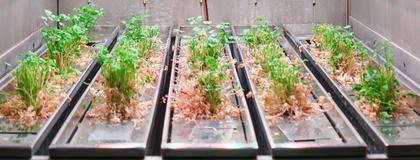
CreatedAtGuelph™ Annual Report 2023-2024
Welcome Message
It is my great pleasure to welcome you to the 2023-2024 Created at Guelph Report. At the University of Guelph, our mission is to create a vibrant ecosystem where ideas flourish, collaboration thrives, and innovation drives meaningful change.
This year’s report showcases a remarkable array of achievements—from cutting-edge research and technologies to entrepreneurial successes and global partnerships. Together, these accomplishments illustrate the transformative power of innovation in tackling the most pressing challenges of our time, from sustainability and food security to health and technology.
Highlights such as Justice Michael Crinson’s keynote on intellectual property strategy, the creative ingenuity of the students participating in Project SOY Plus, and the game-changing advancements in plant-based foods and bioplastics exemplify the spirit of innovation that defines our community. Moreover, our partnerships with industry, government, and global collaborators underscore the essential role of teamwork in amplifying our impact.
In addition to contributing to a thriving campus-linked innovation ecosystem, the Research Innovation Office is proud to drive technology transfer across our campus. This past year, we have seen remarkable growth, including 126 reports of invention, 29 new patent and plant breeders' rights applications, and 21 licenses/options executed contributing directly to the goals of the strategic research plan, From Idea to Impact. Through our commercialization efforts, we ensure that discoveries not only stay in the lab but make meaningful contributions to society and the economy.
Thank you for being a part of this journey. Whether you are a researcher, entrepreneur, partner, or supporter, your contributions are vital to advancing the University of Guelph’s legacy of innovation and knowledge mobilization. Together, we are shaping a better, more sustainable future.
Jump to section
- 126
- REPORTED INVENTIONS
- 21
- NEW LICENSES/OPTIONS
- 322
- ACTIVE LICENSES/AGREEMENTS
- $1.5 M
- LICENSE INCOME
- 28
- SUCCESSFUL RESEARCH PROJECTS SUPPORTED
- 21
- POLICY FELLOWS
A Culture of Innovation
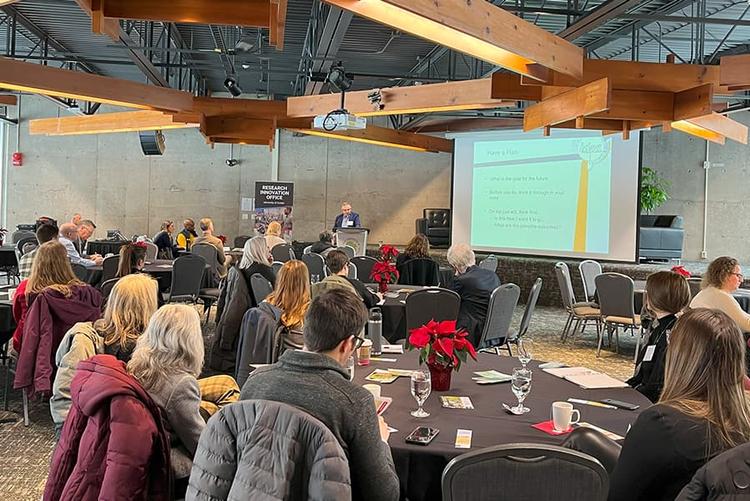
Conversations on IP
On November 29, 2023, the Research Innovation Office hosted the event “Cultivating Innovation: Intellectual Property Strategy for Researchers and Entrepreneurs” to foster collaboration and knowledge exchange in the field of intellectual property (IP). Keynote speaker Hon. Justice Michael Crinson shared insights from his 30-year legal career, emphasizing the importance of learning from both successes and failures in IP strategy. He encouraged a collaborative approach to innovation, leveraging institutional resources like technology transfer offices to navigate IP complexities.
The panel, moderated by RIO's Steve De Brabandere, featured experts from the agri-food sector, including Jennifer Jannuska (Protein Industries Canada), Dr. Michael Lohuis (Semex Alliance), and Sean Thompson (Psigryph Inc.), who discussed strategies for IP management, commercialization, and partnerships. The event highlighted the need for diverse skillsets, strategic IP protection, and ongoing collaboration to drive innovation and economic growth. We are deeply appreciative of the U of G Alumni and dedicated partners who continue to support the advancement of IP education on campus through various initiatives like this event.
Photo: Attendees listen to Hon. Justice Michael Crinson keynote (photo courtesy of Nakita Byrne-Mamahit).

Project SOY Plus
A longstanding U of G student competition, Project SOY Plus highlighted sustainability and innovation, with over 50 students across 12 teams presenting creative solutions for environmental stewardship. The 2024 theme, the circular economy, encouraged students to rethink production, consumption, and recycling. The competition featured diverse projects, from biodegradable bandages to mushroom-based meat alternatives, and introduced a new creative stream for expressive works of art! Congratulations to the winning teams: Scrappy Snacks (Diploma), Foraged Teas (Undergraduate), Mogu (Graduate), and A Majestic Pump (Creative).
Photo: A Majestic Pump was the winning Project SOY Plus 2024 Creative Stream proposal. The winning students, Nicholas Dernovsek and Samantha Heard, were commissioned by the Research Innovation Office to bring their creative proposal to life (photo courtesy of Nakita Byrne-Mamahit).

Global Currents of Innovation
On two occasions, September 2023 and April 2024, the Research Innovation Office had the pleasure of hosting a UK delegation of Small and Medium-sized Enterprises taking part in offerings of the Innovate UK Global Business Innovation Program run in partnership with Protein Industries Canada to strengthen connections across our food sectors to help meet sustainability and net zero goals.
These events offered a platform to showcase the University of Guelph's strengths in food science, plant-based proteins, sustainability, and the circular economy. Researchers took part in impactful discussions, knowledge exchange, and explored potential collaborations between Canada and the UK, reinforcing connections in the innovative food sector.
Photo: UK delegates engaged in conversations with U of G faculty, experts, and industry connections (courtesy of Jodie Shaw).
Adoption of University-Innovated Technologies
Innovation Adds More Stretch to Plant-Based Cheese
Cheese is one of the ultimate comfort foods, and in particular, the gooey melt and stretch associated with shredded cheese toppings on favourites like pizza and nachos. In the plant-based foods space, the development of non-dairy shredded cheese products that melt and stretch like the real thing is a source of constant research. A research collaboration between Daiya Foods and the University of Guelph has resulted in meaningful improvements in the space.
Stacie Dobson and Dr. Alejandro Marangoni worked with Daiya to develop a new patent pending system for producing stretchy plant-based shredded cheeses via in-depth analysis and selection of starches and proteins currently demonstrated in Daiya’s products. The research required use of the Canadian Light Source in Saskatoon, a particle accelerator capable of producing intensely bright light to better see and understanding the interaction of protein, starch and fat at the molecular level.

Our collaboration with the University of Guelph has allowed us to significantly improve the melt and stretch of our cheeses, bringing us closer than ever to delivering the authentic taste and texture of dairy cheese that consumers love.
Roy Tam, Chief Innovation Officer at Daiya Foods
SafePeds: VR Training Program for Child Pedestrian Safety
Children are often vulnerable to traffic injuries, with their inexperience and small stature making them less visible and more at risk. Teaching children how to cross the street safely can also introduce risk when done in ‘real life’ scenarios.
Recognizing this problem Drs. Barbara Morrongiello and Michael Corbett of the Child Development Research Unit in the Department of Psychology developed SafePeds, a behavioural training program that uses virtual reality (VR) to teach children how to safely cross the street. SafePeds has been delivered in some Guelph schools to great effect.
With a goal of improving the program and broadening its impacts, the University entered into a license agreement with the Canada Safety Council in the spring of 2024 in order to develop and widely distribute SafePeds 2.0.
PHOTO: Person wearing VR goggles with view of monitor showing traffic (courtesy of Barbara Morrongiello).


The Canada Safety Council is proud to partner with the University of Guelph to introduce the groundbreaking, research-based SafePeds 2.0 program to a national audience. By prioritizing the safety of our youngest pedestrians, we are creating a strong foundation for safer communities that will benefit us all.
Brewing a Greener Future: Coffee-Based Cutlery Tackles Plastic Waste
With Canada’s single use plastic regulations entering a new phase of restrictions in 2023-2024, University of Guelph researchers Drs. Amar Mohanty and Manju Misra and their team at the Bioproducts Discovery and Development Centre (BDDC) have developed eco-friendly cutlery and stir sticks crafted from coffee bean skins and biopolymers*.
These compostable replacements to single-use plastics have been commercialized by Competitive Green Technologies and are available under the name Ecosys Cutlery. The cutlery and stir sticks debuted in Toronto-area fast-food chains with plans to expand to larger retailers like Staples.
PHOTO: Ecosys Cutlery is based on BDDC research on compostable biocomposites using coffee waste (courtesy of University of Guelph).
*Research supported by the Ontario Ministry of Colleges and Universities; the Natural Sciences and Engineering Research Council of Canada; Agriculture and Agri-Food Canada; the Canada Foundation for Innovation; U of G alumni; private partners including BMO Financial Group; and the Ontario Agri-Food Innovation Alliance, a collaboration between the Ontario Ministry of Agriculture, Food and Rural Affairs and the University of Guelph.
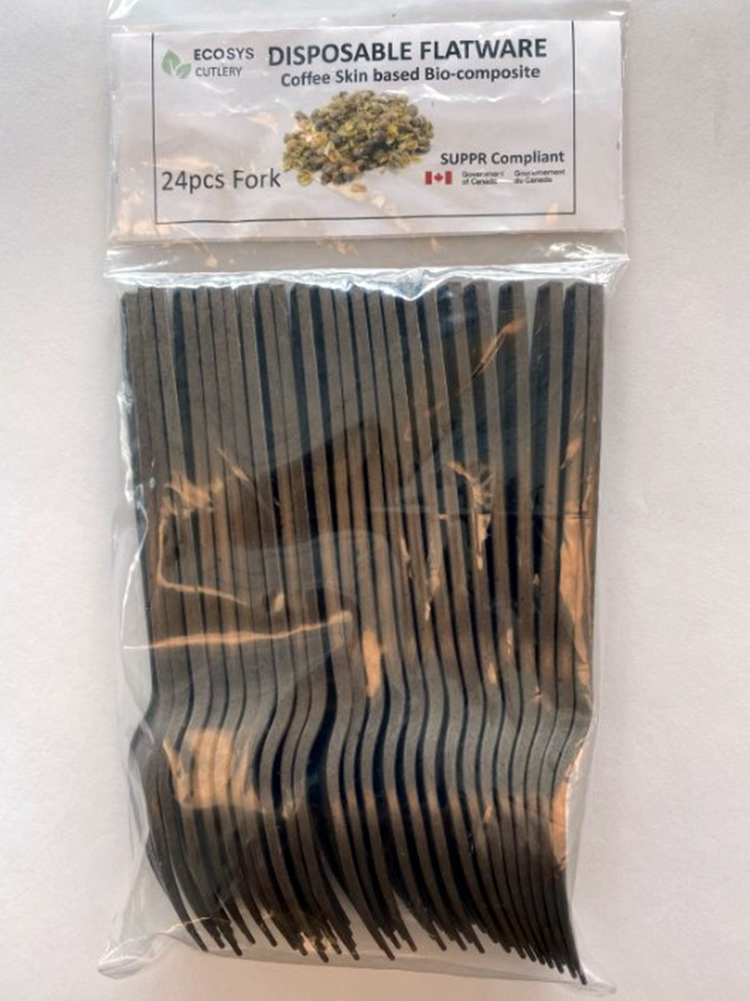
Stronger Collaborations for Greater Impact
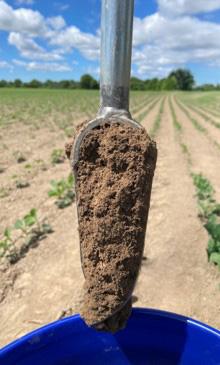
Development of Rapid Quantification of Soil Organic Carbon Pools via Photocatalytic Kinetics
Existing methods to measure soil organic carbon (SOC) are costly, time-consuming, and inaccessible for many farmers, discouraging widespread monitoring of soil health and carbon storage. Recognizing this challenge, Profs. Emily Chiang and Rafael Santos partnered with MANTECH Inc. on an NSERC Alliance project to develop a rapid, cost-effective method for SOC analysis using photocatalytic kinetics. This work resulted in a bench-top protocol integrated with MANTECH’s PeCOD analyzer, capable of analyzing SOC and its labile, humus, and resistant fractions. MANTECH used this bench top technology to create a hand held version used for WWF’s Nature x Carbon challenge, contributing valuable insights into SOC measurement methods and soil carbon dynamics.
The project trained two MASc students and an undergraduate research assistant in advanced soil and instrumentation techniques, who have since graduated. It also secured Mitacs funding for further academic-industry collaborations, exemplifying the strong partnership between MANTECH and the University of Guelph. The lab-based SOC analysis method offers applications in wetland monitoring and other conservation efforts, supporting sustainable agriculture and carbon sequestration initiatives.
Photo: Field soil sample (courtesy of Emily Chiang).
Mitigating Resistance in European Corn Borer to Protect Bt Corn in Canada
The European corn borer (ECB) has long been a significant pest for corn production in North America, causing yield losses and harvest challenges. Genetically modified Bacillus thuringiensis (Bt) corn, introduced in 1996, revolutionized pest management by expressing insecticidal proteins from Bt, reducing ECB damage and mitigating losses. Today, 85% of Canadian corn acres are planted with Bt corn. However, the sustainability of Bt corn is under threat due to resistance development in ECB populations.
In 2018, the first confirmed case of practical field-evolved resistance to Bt corn in North America was discovered in Nova Scotia. This resistance to the Cry1F protein poses a significant challenge to maintaining Bt corn’s effectiveness. To address this, a multidisciplinary research team, led by Drs. Jocelyn Smith and Rebecca Hallett from the University of Guelph, is collaborating with a diverse network of industry and government partners through an NSERC Alliance grant, including:
- Atlantic Grains Council
- Bayer CropScience Inc.
- Centre de recherche sur les grains (CEROM)
- Grain Farmers of Ontario
- Manitoba Agriculture
- Manitoba Corn Growers Association
- Ontario Ministry of Agriculture, Food and Agribusiness (OMAFA)
- Perennia Food and Agriculture
- Pioneer Hi-Bred Canada Company
- Syngenta Canada
This diversity of partners across Canada ensures that research outcomes address region-specific challenges while creating a unified national approach to sustainable pest management. The project focuses on understanding Cry1F resistance in ECB, mapping its distribution, assessing susceptibility to other Bt proteins, and evaluating strategies to enhance insect resistance monitoring (IRM) using molecular tools. This collaboration is essential to protect Canadian agriculture, maintain Bt corn’s viability, and support farmers across the country.
The partnerships established through this project have facilitated expanded collecting and testing of ECB populations across eastern Canada using sentinel plots with seed provided by industry partners. A major breakthrough of this project has been the identification of molecular markers linked to Cry1F resistance in ECB, published in Scientific Reports in 2023. These markers are now being used internationally to enhance insect resistance monitoring of Cry1F. This has led to additional collaborations including U.S. researchers screening ECB populations under a USDA grant and applying a novel targeted sequencing technique developed by the University of Tennessee. The collaborations fostered by this project have strengthened knowledge transfer nationally and internationally, ensuring that corn producers across Canada, as well as U.S. researchers, growers, and regulatory bodies in both countries receive the latest research findings and extension information.
Photo: European corn borer feeding on Cry1F corn Hybrid (left below - courtesy of Jocelyn Smith). European corn borer larva (right below - courtesy of Jocelyn Smith).
*This research took place, in part, at the Ontario Crops Research Centre sites in Ridgetown and Winchester, which are owned by Agricultural Research and Innovation Ontario and managed by U of G through the Ontario Agri-Food Innovation Alliance.
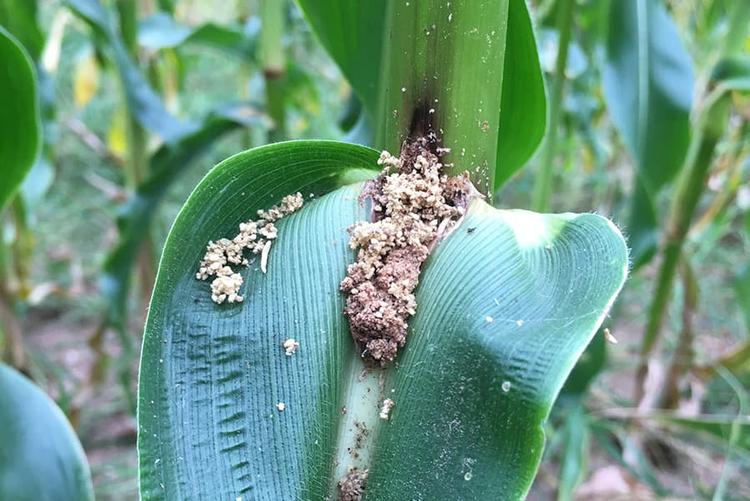
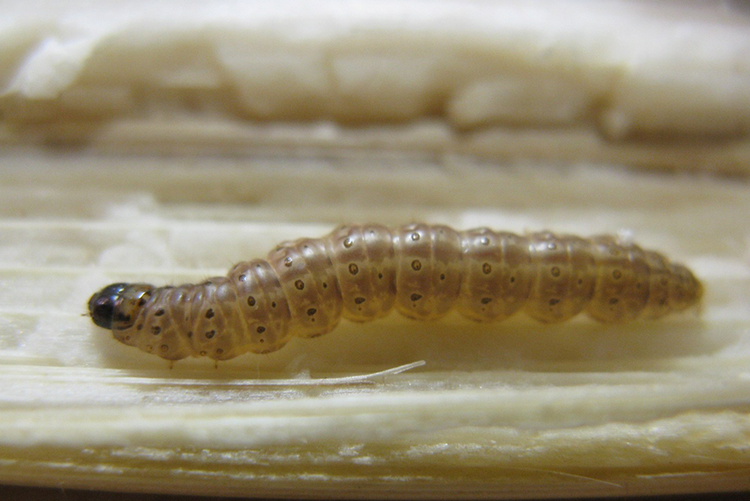

Modelling Analysis and Processability Optimization of PHA Bioplastics
The demand for biodegradable plastics is rapidly increasing as industries seek sustainable solutions to combat plastic pollution. Traditional biodegradable polymers, such as polyhydroxyalkanoates (PHAs), rely on expensive feedstocks like corn or sugarcane, limiting their cost-effectiveness. Genecis Bioindustries Inc., however, has developed a groundbreaking process to produce PHA polymers using organic food waste, reducing production costs by 40% while delivering comparable quality and functionality.
In partnership with Dr. Ibrahim Deiab and supported by an NSERC Alliance grant, this project investigates the manufacturability, processability, and biodegradability of Genecis’ PHA bioplastics for applications such as food packaging and disposable tableware. The research focuses on optimizing injection molding and 3D printing processes to create cost-effective, high-performance products that biodegrade in less than a year in natural environments.
The collaboration provided Genecis with data, case studies, and analyses to demonstrate the commercial viability of their bioplastics. Success in this area not only supported Genecis’ market expansion but also helped position Canada as a leader in bioplastic innovation, creating jobs and reducing the environmental footprint of businesses. By leveraging food waste to produce biodegradable plastics, this partnership offers a scalable, eco-friendly alternative to conventional plastics, aligning with global efforts to reduce plastic pollution and foster a circular economy.
PHOTO: Demo plant at StormFisher (courtesy of Junewei Lv).
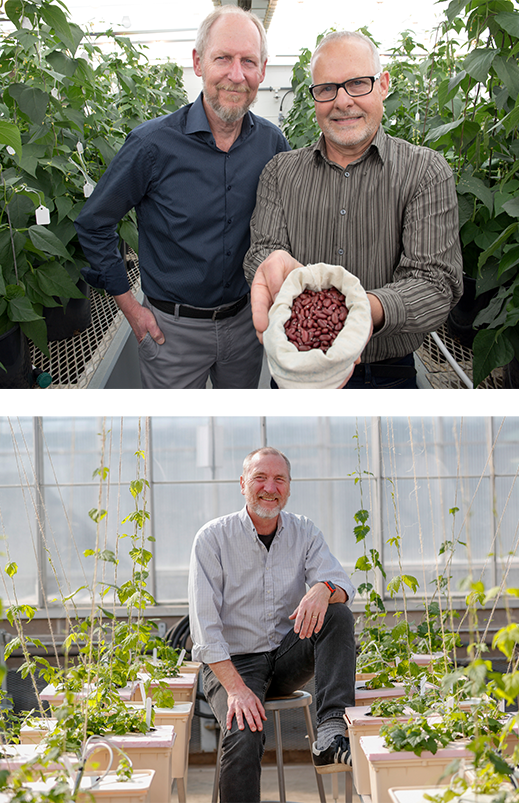
2024 Innovation of the Year
Having transformed the landscape of kidney bean cultivation across North America, making up 90% of all dark red kidneys grown in Ontario and an impressive 60% of dark red kidney bean acreage on the continent, the Dynasty Dark Red Kidney Bean has been recognized as the University of Guelph 2024 Innovation of the Year.
Bred at the University of Guelph by Dr. K. Peter Pauls, Dr. Thomas Michaels, and Tom Smith, and brought to market by Hensall District Co-operative Inc. the variety has garnered acclaim for its exceptional yields, stress tolerance, adaptability, and increased profitability for growers.
PHOTO: Top: Peter Pauls (left) and Tom Smith (right) with Red Kidney beans surrounded by growing bean plants (courtesy of Martin Schwalbe). Bottom: Tom Michaels sitting among young greenhouse beans (courtesy of Tom Michaels).
*This research was funded in part by the Ontario Agri-Food Innovation Alliance, and took place, in part, at the Ontario Crops Research Centre in Elora, which is owned by the Agricultural Research and Innovation Ontario (ARIO) and managed by U of G through the Alliance.
Cybersecurity in Agriculture Series
In April 2024, the Research Innovation Office led a series of events to raise awareness about cybersecurity threats in the dairy sector, supported by Food from Thought and the Ontario Agri-Food Innovation Alliance. These initiatives included a booth and seminar at the Canadian Dairy XPO, a simulation at the Ontario Dairy Research Centre (ODRC*), and a cybersecurity panel at Cutten Fields. The events aimed to inform dairy producers, cybersecurity experts, and government representatives about the increasing risk of cyberattacks. Key topics discussed were the vulnerabilities in farm management software, the importance of regular system updates, and the need for training farm staff to recognize and respond to cyber threats. Experts highlighted the critical need to secure data related to livestock health, production metrics, and financial transactions to prevent significant disruptions and financial losses. The events emphasized the importance of collaboration across industry, government, and sectors to tackle cybersecurity issues.
The ongoing concern and conversation around cybersecurity in agriculture was further highlighted by the announcement of Ontario’s Cybersecurity Preparedness Initiative in September, which provides up to $50,000 for cybersecurity enhancements tailored to the needs of agricultural marketing boards.
PHOTO: Top: Dr. Ali Dehghantanha (left) and Tyler Zemlak (right) at the Canadian Dairy XPO (courtesy of Nakita Bryne-Mamahit). Bottom: Dr. Lucas Alcantara speaks to industry professionals at the Ontario Dairy Research Centre (courtesy of Vutsup Media).
*The ODRC is owned by Agricultural Research and Innovation Ontario (ARIO) and managed by U of G through the Alliance.
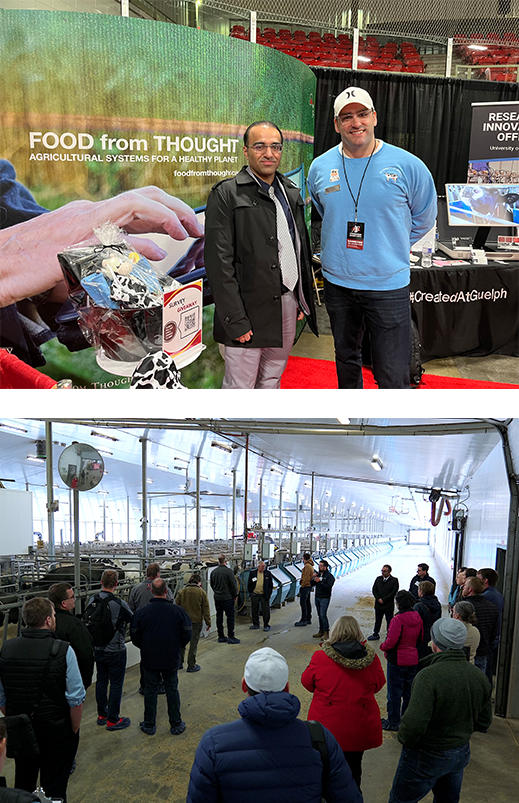
Advancing Research Impact Fund
2022 Knowledge Mobilization Project Updates
With the goal of increasing the uptake of research findings by the public sector in efforts to create environmental, societal, and/or economic benefits the Advancing Research Impact Fund approved its' first projects within the Knowledge Mobilization Stream in 2022. The projects supported are meant to share research-based knowledge and innovations with decision makers and to support implementation or adoption by government, community organizations and industry. Five teams were successful in receiving $30,000 each for their projects, including Dr. Katie Wood's "Beef@Guelph Research Roundup Field Day and Other KTT activities."
Dr. Wood and the Beef@Guelph team created materials and led a series of impactful extension events aimed at promoting technology adoption and increasing awareness of beef cattle research. Their efforts shared research among beef industry professionals aimed at improving health, efficiency, production, and animal welfare, while continuing to support the Canadian and Ontario beef industries as global leaders in high-quality and sustainable beef production. Project highlights include:
- Beef@Guelph Field Days: Two field days featured expert speakers like Christine O'Reilly and James Byrne, along with research updates from team members. These events engaged producers and provided continuing education credits.
- Beef Farmers of Ontario AGM: The team hosted a booth at the AGM, connecting with 400 producers and forming a new partnership with Canada Beef, leading to the Canada Beef/Taste Canada culinary competition tour in October 2024.
- Virtual Beef Symposium: The team organized a two-part virtual symposium covering topics like genetics, technology, market outlooks, and production costs. Over 200 unique attendees participated across both nights.
- Beef Day @Guelph: Calving School Edition: This sold-out event in December 2023 attracted 100 attendees and featured a keynote by Dr. Clair Windeyer, along with presentations on fetal programming, meat quality, and calving tips.
- Feedlot Management School: The team hosted part of the Beef Farmers of Ontario’s Feedlot Management School, offering a meat-cutting demo and a nutrition presentation to 110 producers.
Additional updates on the other 4 project's funded under the Knowledge Mobilization Stream can be found below under the tabs listing the projects primary investigators.
Digital agriculture in Canada: opportunities and constraints in a climate change era
Digital agriculture is at the forefront of innovation, and as such, it is important to connect the emerging research with the people who can apply it. Dr. Evan Fraser is using the 2022 Advancing Research Impact Funding (Knowledge Mobilization Stream) to create publicly-accessible policy briefs, podcasts, infographics, and explainer videos. These tools will help connect with federal and provincial ministries of agriculture and climate change, innovation centres, agricultural equipment managers, farmers’ associations, and other industry partners.
Visit the Arrell Food Institute website for more resources.
Impact of ALUS land restoration activities on ecosystem services
ALUS (Alternative Land-Use Services) is a unique program that brings together farmers and environmentalists to reimagine marginal agricultural lands into ecologically valuable habitats. This network of over 52,000 acres of projects throughout Canada and the US is creating regionally-customized strategies to enhance biodiversity, sequester carbon, improve water quality and reduce the risk of floods and droughts, and strengthen the local community’s climate resilience. Dr. John Fryxell is serving as a guest editor of the journal FACETS to produce a series of peer-reviewed articles to bring together the research on ALUS projects and synthesize the implications of these programs. This collection of papers in a special issue will provide key information and data for policymakers and other professionals in this sector to make evidence-informed decisions about best practices at the intersection of agriculture and the environment.
Fishy Business: Seafood Mislabeling is a Bait and Switch
When you order seafood at a restaurant or purchase it at the grocery store, you expect to receive what the label indicates. But rates of incorrect or misleading labelling could be as high as 50%, as Dr. Daniel Gillis has found. His team has developed advanced statistical models to better forecast the factors that contribute to seafood fraud and identify where, how, and by whom this mislabeling occurs. This research will help inform better management practices throughout the seafood supply chain and empower consumers to have confidence when purchasing seafood. This model is now available as an R Shiny app and the results have been published in a peer-reviewed article by bioRxiv.
Heritage and feral apple identification: leveraging a genetic tool for community Engagement
Apples rely on cross-pollination to produce fruit, but keeping track of apple family trees can get complicated. That’s where Dr. Brian Husband and his genotype library of apple cultivars can help! This is a great tool for apple growers looking to confirm the identity of the trees in their orchards, collectors of heritage varieties of apples, public parks and community organizations, as well as individuals with mystery apple trees on their properties. This is the only service of its kind in Canada and one of only a few in North America.
2023 Advancing Research Impact Fund - Commercialization Stream
The April 2023 Sustainable Agri-Food Futures event brought together stakeholders across the agricultural sector to discuss challenges, collaborate and generate game-changing ideas to reclaim soil health. The seven letters of intent that resulted from the day have yielded four successful projects, each awarded $40,000 from the Advancing Research Impact Fund (ARIF), made possible by Food from Thought and the Canada First Research Excellent Fund, to develop proof-of-principle solutions aimed at advancing sustainable agricultural practices.
The projects receiving funding are:
- Confirming and Scaling up Soil Tests using Sensors (Dr. Asim Biswas)
- Ontario Sheep Farmers: Grazing for Hire (Drs. Felix Arndt, Audrey Jamal, Elizabeth Kurucz, and Kim Schneider)
- Development of Iron Oxide Nanoparticles for Soil Improvement (Drs. Ashutosh Singh and Abdallah Elsayed)
- Enabling No-till Corn and Soybean Production in High-residue Environments (Drs. Joshua Nasielski and David Hooker)
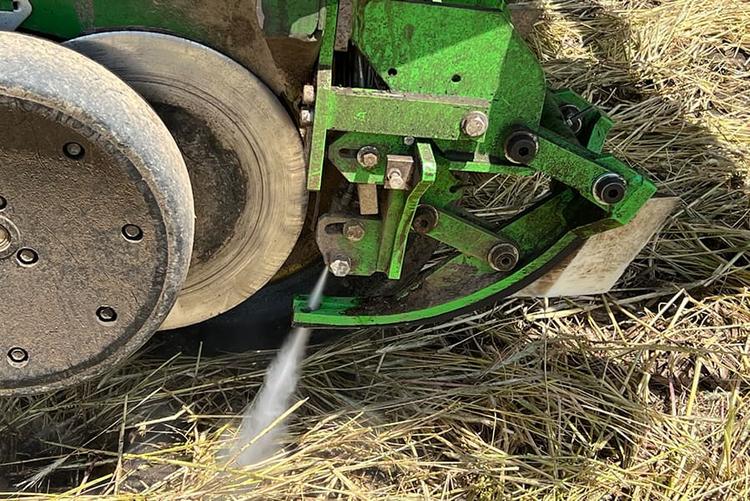
ARIF Project Spotlight: Enabling No-till Corn and Soybean Production in High-residue Environment
In an innovative partnership with Susterre Technologies, Professors Joshua Nasielski and David Hooker at the University of Guelph are working to advance no-till farming in high-residue environments for corn and soybean production. This industry-sponsored research project focuses on testing the efficacy of Susterre's new technology, which utilizes high-pressure water jets in planter components to support effective no-till practices under heavy crop residue. The project is expected to yield insights that could improve soil health and productivity for cash crop farmers in Ontario.
Supported by the Food-from-Thought initiative through the Research Innovation Office’s Sustainable Agri-Food Futures program, this collaboration aims to validate Susterre’s innovation through rigorous field trials at the Ontario Crops Research Centre* sites in Ridgetown and Winchester. With results anticipated by late 2024 or early 2025, the research will assess the technology's impact on Ontario's diverse agricultural landscape, providing data to inform potential adoption by local cash crop producers.
This project exemplifies the potential of strategic university-industry collaborations to drive meaningful advancements in sustainable agriculture, reinforcing Ontario’s commitment to soil health and resilient farming practices.
Photo: Susterre technology using high pressure water jet (courtesy of Michael Cully).
*The Ontario Crops Research Centre is owned by Agricultural Research and Innovation Ontario and managed by U of G through the Ontario Agri-Food Innovation Alliance.
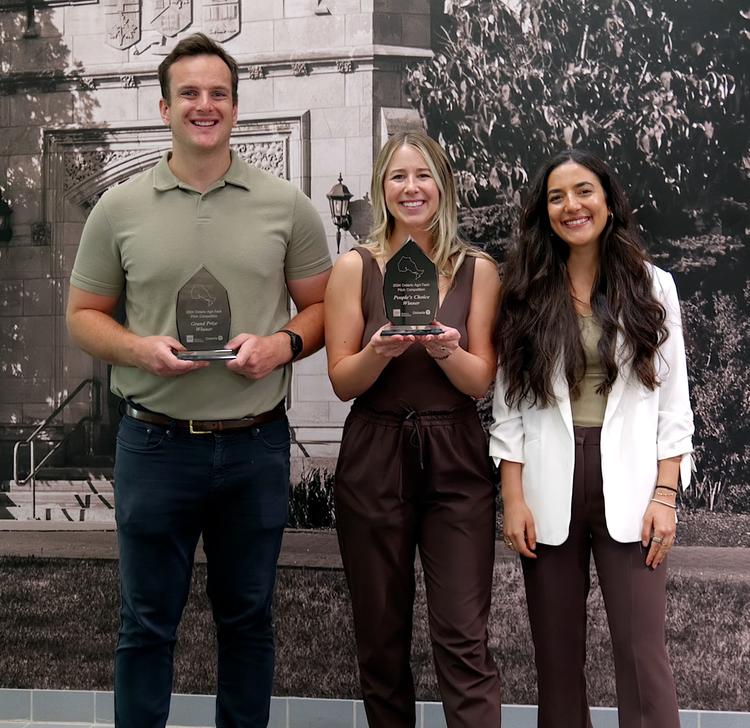
Ontario Agri-Tech Pitch Competition
The Research Innovation Office was proud to once again collaborate with the Government of Ontario to deliver the Ontario Agri-Tech Pitch Competition in June 2024, concluding the program that was established under the Gryphon's LAAIR Program funded through the Ontario Agri-Food Innovation Alliance.
To raise awareness about the problems in the agri-food sector and showcase investible companies and solutions, the pitch competition offered a platform for five Ontario-based start-ups operating in the agri-tech and agri-food spaces to pitch their ideas to over 300 farmers, academics, entrepreneurs and investors that tuned in virtually or attended the competition in person.
Beck’s Broth, a pasture-rasied organic bone broth company, walked away as the People’s Choice winner, and Interius Farms, a company bringing vertical farming technology to greenhouses to help reduce their spatial and environmental footprints, took the competition’s top prize of $10,000.
PHOTO: Ontario Agri-Food Pitch competition winners (left to right): Jonnie Lawson (Grand Prize), Beckie Prime and Dominque Mastronardi (People's Choice) (courtesy of Vutsup Media).

Agricultural Genomics Action Centre
The Research Innovation Office is honored to serve as the administrative home for the Agricultural Genomics Action Centre (AG-ACt*), the Knowledge Mobilization and Implementation Coordination Hub in Genome Canada's Climate Smart Agriculture and Food Systems initiative. Through its funding of nine Interdisciplinary Challenge Teams and two Hubs this initiative represents a critical step toward developing cutting-edge genomic research and innovation to reduce greenhouse gas emissions and the carbon footprint of Canada’s food production systems.
With partners at Simon Fraser University, the Global Institute for Food Security at the University of Saskatchewan, and the Université de Montréal, the AG-ACt will facilitate collaboration, drive innovation, and share knowledge across agri-food sectors and beyond to help mitigate the impact of food systems and agricultural practices on climate change.
PHOTO: Project Leadership and Operations Team, Agricultural Genomics Action Centre (courtesy of John Wills Photography).
*AG-ACt is funded by the Government of Canada through Genome Canada and Ontario Genomics (OGI-237).

Genomics research is instrumental in responding to national and global challenges, such as climate change and food insecurity. [The] announcement of $6.6 million in federal funding for two new genomics hubs underscores Canada’s leadership in genomics research. These hubs are critical to ensuring Canadian research remains at the forefront globally, advancing innovative solutions to reduce the carbon footprint of our food production systems.
~ The Honourable François-Philippe Champagne, Minister of Innovation, Science and Industry
Sustainable Agri-Food Futures
For a second year the University of Guelph’s Research Innovation Office and Western University’s Innovation North partnered to deliver a Sustainable Agri-Food Futures event. In March 2024, diverse perspectives from across academia, industry and the agricultural community were brought together to discuss current priority problems in livestock. The attendees explored opportunities to co-develop innovative practices and practical technologies to address pressing issues such as biosecurity, farm infrastructure, climate change impacts (like adverse weather), animal health-information systems, and animal healthcare delivery.
These attendees, and researchers from across the University of Guelph, were then invited to submit collaborative project proposals aimed at improving the livestock sector in Canada to the Amplifying Research Impact Fund (ARIF) - Livestock Innovation Grants, funded by Food from Thought.
Entrepreneurial Success

LandWise Analytica
Co-founded by Aman Bhullar (PhD, Department of Mathematics and Statistics) and Patrick McMillan (PhD, Bioinformatics), LandWise Analytica is commercializing cutting-edge research into a start-up venture. Their focus is on a state-of-the-art algorithm designed to assess and predict optimal land use practices for agriculture.
Their tool is poised to impact three key sectors: government policy addressing climate change-induced food insecurity, crop insurance models and fraud detection, and agricultural real estate by providing current and projected land assessments. With backing from the Grow Ontario Accelerator Hub and participation in the NEC X accelerator program (partnered with Silicon Valley’s Plug and Play Tech Center), LandWise Analytica has achieved a valuation of $2,000,000 USD.
They are now working towards a soft launch with agricultural realtors by the end of the year, offering “CARFAX”-style reports for farms, which will include historical yields and future land suitability projections.

PatchIT Solutions
Founded by School of Computer Science master’s student Keerthana Madhavan along with a co-founder, PatchIT Solutions is a cybersecurity company specializing in software-based solutions. Their flagship product, PatchLink, is vulnerability management software aimed at streamlining and transforming organization processes with generative AI.
The company has completed multiple start-up incubators and accelerators, including the Hub Incubator at the John F. Wood Centre at the University of Guelph, NVIDIA Inception, and the Founder Institute. Currently, PatchIT Solutions has secured enrollment in the Microsoft for Startups Founders Hub program, a leading start-up support initiative. PatchIT Solutions' current objectives include securing funding, expanding their team, and preparing for the 2025 launch of its minimal viable product, with secured pilot customers.

Dice Health
Founded by School of Engineering master’s graduate Abdullah Al-Hayali, Dice Health is making veterinary healthcare documentation a lot more efficient with their flagship product, Vet Scribe. Vet Scribe automates the documentation process for veterinary healthcare providers, allowing them to spend more time with pets and less on paperwork.
The company has participated in two incubators/accelerators: the Hub Incubator at the John F. Wood Centre at the University of Guelph and NEXT AI in Montreal. Dice Health has already gained significant traction in South Korea, with around 200 clinics and 1,200 users. The company is also preparing to launch a consumer-facing app by the end of the year, expanding its reach further.
Knowledge Mobilization
Policy Fellowship in Agriculture, Food, and Biodiversity
With the highest enrollment yet for the program, the University of Guelph Policy Fellowship Program returned in May 2023 with a “One Health” themed cohort, run in partnership with the One Health Institute.
Hosted over two days on the University of Guelph main campus, Fellows engaged in panel presentations, workshop sessions and conversations related to one health topics, including wildlife health, watershed health, zoonotic disease and surveillance, climate change and biodiversity loss.
PHOTO: One Health Policy Fellows examine a beehive frame at the Honey Bee Research Centre (courtesy of Valerie Hruska).
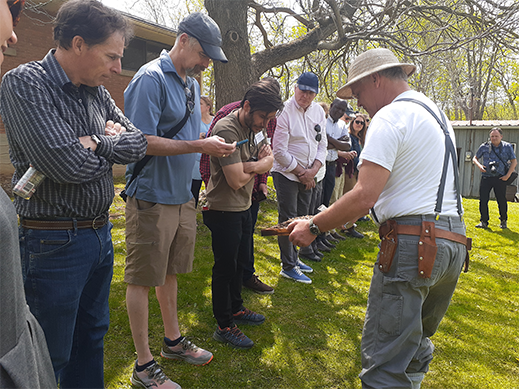
Skills for Research Impact Series
Fall 2023 and Winter 2024 semesters once again saw the Skills for Research Impact Series of workshops return to provide support to University of Guelph faculty, research staff, and graduate students. Workshop participants attended expert-led sessions focused on knowledge mobilization activities that can be applied directly to their work to enhance the impact of their research.
- 13
- Sessions
- 452
- Participants
- 678
- Skills Development Hours
